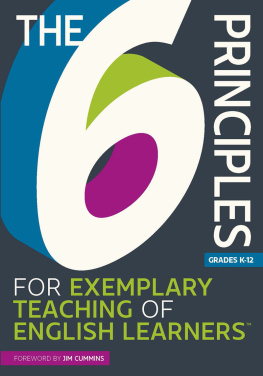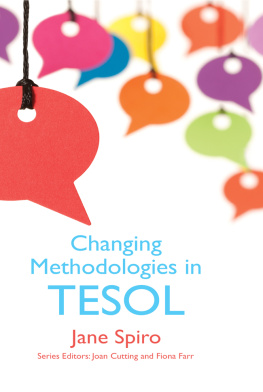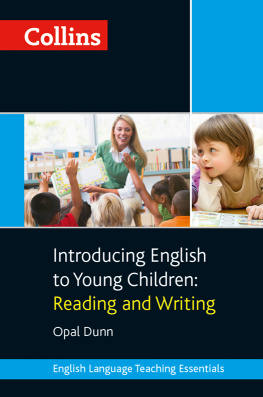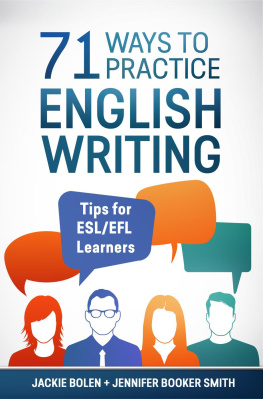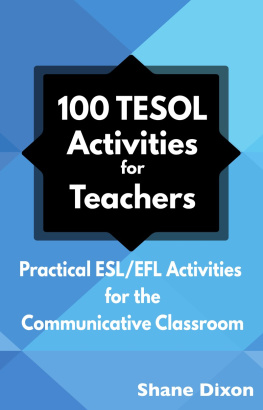TESOL International Association Writing Team - The 6 Principles for Exemplary Teaching of English Learners®
Here you can read online TESOL International Association Writing Team - The 6 Principles for Exemplary Teaching of English Learners® full text of the book (entire story) in english for free. Download pdf and epub, get meaning, cover and reviews about this ebook. year: 2018, publisher: TESOL Press, genre: Home and family. Description of the work, (preface) as well as reviews are available. Best literature library LitArk.com created for fans of good reading and offers a wide selection of genres:
Romance novel
Science fiction
Adventure
Detective
Science
History
Home and family
Prose
Art
Politics
Computer
Non-fiction
Religion
Business
Children
Humor
Choose a favorite category and find really read worthwhile books. Enjoy immersion in the world of imagination, feel the emotions of the characters or learn something new for yourself, make an fascinating discovery.
- Book:The 6 Principles for Exemplary Teaching of English Learners®
- Author:
- Publisher:TESOL Press
- Genre:
- Year:2018
- Rating:5 / 5
- Favourites:Add to favourites
- Your mark:
- 100
- 1
- 2
- 3
- 4
- 5
The 6 Principles for Exemplary Teaching of English Learners®: summary, description and annotation
We offer to read an annotation, description, summary or preface (depends on what the author of the book "The 6 Principles for Exemplary Teaching of English Learners®" wrote himself). If you haven't found the necessary information about the book — write in the comments, we will try to find it.
The 6 Principles for Exemplary Teaching of English Learners® — read online for free the complete book (whole text) full work
Below is the text of the book, divided by pages. System saving the place of the last page read, allows you to conveniently read the book "The 6 Principles for Exemplary Teaching of English Learners®" online for free, without having to search again every time where you left off. Put a bookmark, and you can go to the page where you finished reading at any time.
Font size:
Interval:
Bookmark:
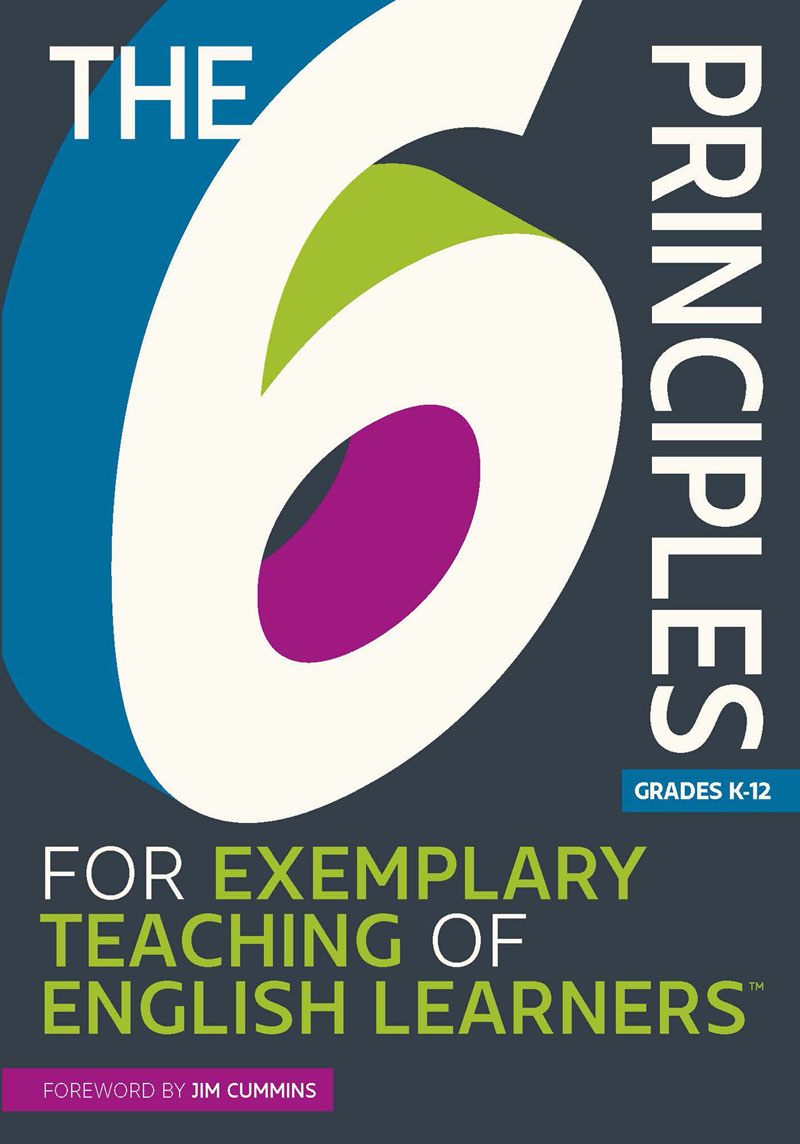
Exemplary teaching of English learners rests on the following 6 Principles:
1. Know your learners. Teachers learn basic information about their students families, languages, cultures, and educational backgrounds to engage them in the classrooms and prepare and deliver lessons more effectively.
2. Create conditions for language learning. Teachers create a classroom culture that will ensure that students feel comfortable in the class. They make decisions regarding the physical environment, the materials, and the social integration of students to promote language learning.
3. Design high-quality lessons for language development. Teachers plan meaningful lessons that promote language learning and help students develop learning strategies and critical thinking skills. These lessons evolve from the learning objectives.
4. Adapt lesson delivery as needed. Teachers continually assess as they teachobserving and reflecting on learners responses to determine whether the students are reaching the learning objectives. If students struggle or are not challenged enough, teachers consider the possible reasons and adjust their lessons.
5. Monitor and assess student language development. Language learners learn at different rates, so teachers regularly monitor and assess their language development in order to advance their learning efficiently. Teachers also gather data to measure student language growth.
6. Engage and collaborate within a community of practice. Teachers collaborate with others in the profession to provide the best support for their learners with respect to programming, instruction, and advocacy. They also continue their own professional learning.

TESOL International Association
1925 Ballenger Avenue
Alexandria, VA 22314 USA
www.tesol.org
Director of Publishing and Product Development: Myrna Jacobs
Copy Editor: Anita Draper
Cover and Interior Design: Kirsten Ankers, Citrine Sky Design
Layout: Capitol Communications, LLC
Printing: Gasch Printing, LLC
Copyright 2018 by TESOL International Association. All rights reserved.
All rights reserved. Copying or further publication of the contents of this work is not permitted without permission of TESOL International Association, except for limited fair use for educational, scholarly, and similar purposes as authorized by U.S. Copyright Law, in which case appropriate notice of the source of the work should be given. Permission to reproduce material from this book must be obtained from www.copyright.com, or contact Copyright Clearance Center, Inc., 222 Rosewood Drive, Danvers, MA 01923, 978-750-8400.
Every effort has been made to copyright holders for permission to reprint borrowed material. We regret any oversights that may have occurred and will rectify them in future printings of this work.
ISBN 978-1-945351-35-8
Library of Congress Control Number 2017964569
Recommended citation:
TESOL International Association (TESOL). (2018). The 6 principles for exemplary teaching of English learners: Grades K12. Alexandria, VA: Author.
BULK PURCHASES
Quantity discounts are available for workshops and staff development. Visit www.tesol.org/read-and-publish/bookstore/book-ordering-policies or call 1 888-891-0041.
First edition, 2018
6 7 8 9 10 11 12
I t is a privilege to write a foreword to this immensely valuable book. The 6 Principles for exemplary teaching of English learners elaborated in these pages provide an evidence-based foundation for schools to examine their own instructional practice and work collaboratively with colleagues, parents, and policymakers to enable English learners to acquire strong social and academic language proficiency. A major strength of the book is its inclusion of the entire school communityadministrators, English language teachers, content teachers, school librarians, guidance counselors, and other groups of educatorswithin the scope of exemplary teaching of English learners. As noted in of concrete ways in which these various groups of educators can apply the 6 Principles opens not just a culture of shared responsibility within the school, but also a culture of shared opportunity. As our expertise to work effectively with diverse learners expands, so too does our sense of affirmation as educators.
An additional strength of the book is the way in which it highlights the instructional implications of well-established research findings that are frequently overlooked in teaching English learners. For example, it is now well-established that bilingualism represents a positive force in childrens cognitive and academic development, particularly when literacy is developed in both languages. However, in classroom contexts where multiple languages are represented, many educators have been unsure about how to engage students multilingual repertoires. In response to this uncertainty, the classroom vignettes and instructional suggestions throughout this book illustrate how teachers, school librarians, and other professionals can mobilize students home languages as cognitive resources and instructional tools to enrich the learning of all students.
Another significant emphasis throughout this book is on the importance of encouraging English learners to become avid readers, ideally in both English and their L1. There is extensive research evidence regarding the impact of print access and literacy engagement on the development of students reading comprehension skills (e.g., OECD, 2010). As noted in , students who read extensively encounter more words and meet each word more frequently, which can result in a larger vocabulary and deeper word knowledge. Unfortunately, this research was largely ignored in reading policies instituted under the No Child Left Behind legislation that operated between 2002 and 2015 (Cummins, 2007).
The importance of promoting active literacy engagement is illustrated in the Programme for International Student Assessment (PISA), an international assessment initiative involving more than 70 countries and hundreds of thousands of 15-year-old students conducted by the Organisation for Economic Cooperation and Development (OECD) over the past 20 years. The PISA research has consistently shown that reading engagement is a stronger predictor of reading achievement than students socioeconomic status (SES). Furthermore, the OECD (2010) reported that there was about a one-third overlap between the negative effects of low SES and the positive effects of reading engagement. The implication is that schools can potentially push back about one-third of the negative effects of socioeconomic disadvantage by ensuring that students have access to a print-rich environment and become actively engaged with literacy.
This finding assumes relevance in the present context because a large proportion of English learners come from lower-income communities with significantly less access to print in their schools and homes than is the case for students from middle-income communities (e.g., Duke, 2000). Immersion of these students in a literacy-rich environment from the day they enter school is a powerful tool in accelerating their academic catch-up trajectory.
Font size:
Interval:
Bookmark:
Similar books «The 6 Principles for Exemplary Teaching of English Learners®»
Look at similar books to The 6 Principles for Exemplary Teaching of English Learners®. We have selected literature similar in name and meaning in the hope of providing readers with more options to find new, interesting, not yet read works.
Discussion, reviews of the book The 6 Principles for Exemplary Teaching of English Learners® and just readers' own opinions. Leave your comments, write what you think about the work, its meaning or the main characters. Specify what exactly you liked and what you didn't like, and why you think so.

